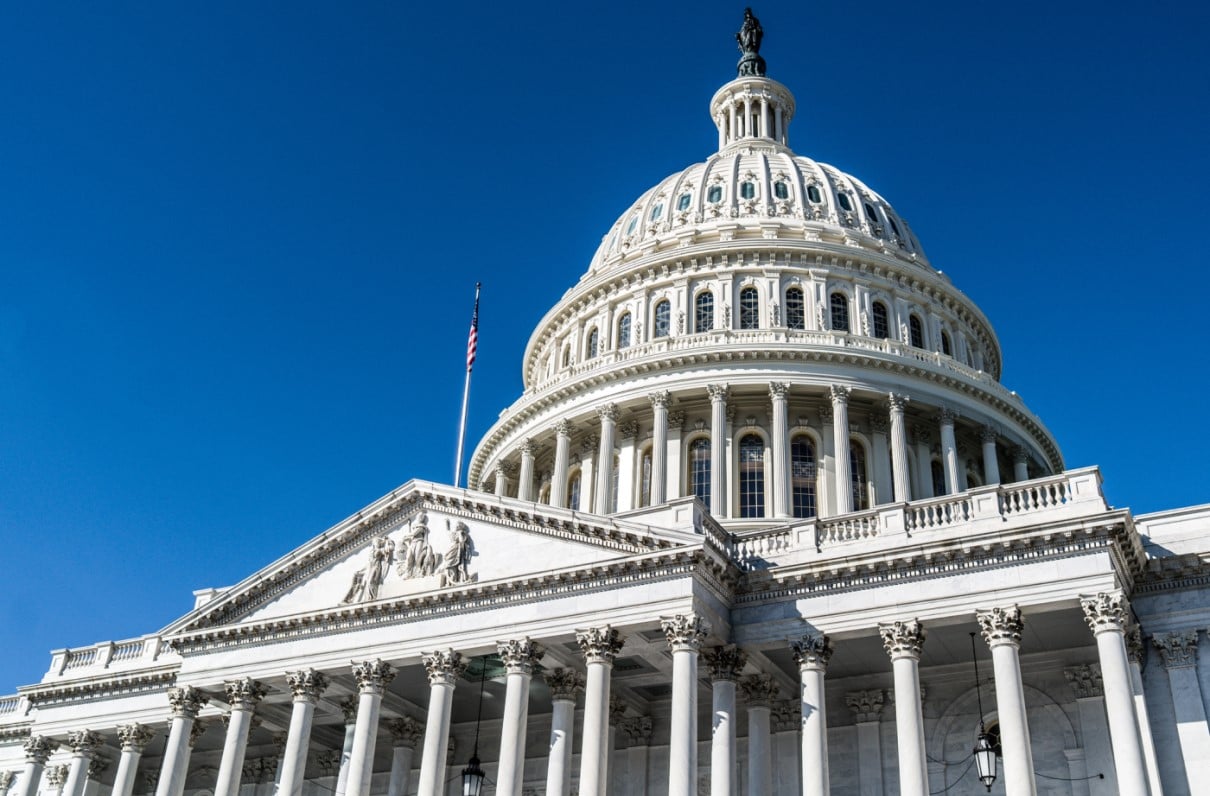The recent release of the president’s budget request marked the official launch of the FY 2025 appropriations process, which will fund congressional authorization bills like the National Defense Authorization Act (NDAA).
MOAA, the Military Coalition (TMC), and other stakeholder groups already have engaged with lawmakers to advocate for key priorities they would like to see addressed in the FY 2025 NDAA. This must-pass legislation offers the largest annual platform for MOAA’s work to support and protect service-earned benefits, while ensuring the continued strength of the all-volunteer force.
Here’s a look at some of the key issues MOAA will champion for inclusion in the FY 2025 NDAA, along with links to more information and ways you can make your voice heard via our Legislative Action Center.
Currently Serving
Uniformed Services Pay Raise: The Employee Cost Index (ECI) rose 4.5% in the third quarter of FY 2023; by statute, that figure should set the pay raise for servicemembers beginning in January 2025. Congress must sustain these increases – they are vital for our servicemembers’ financial well-being, as well as for the military’s ability to remain competitive with private sector pay in the midst of ongoing recruiting challenges.
Basic Allowance for Housing (BAH): MOAA urges Congress to support the BAH Restoration Act (H.R. 2537/S. 1823) and include it as part of the FY 2025 NDAA so that BAH is restored to 100% of projected housing costs, up from the current 95%. This is especially important with rising housing costs and general inflation.
[ADVOCACY IN ACTION: Help MOAA Restore the BAH]
Basic Needs Allowance (BNA) Calculation: Food insecurity among the ranks is a problem, especially for junior servicemembers and their families. DoD’s budget request included a change in eligibility for the BNA, boosting the threshold from 150% to 200% of the federal poverty guidelines. Congress must include this program improvement in this year’s NDAA. As currently drafted, BNA fails to reach most of the military families facing food insecurity.
DoD Health Care
Qualifying Life Events (QLEs): Given ongoing capacity constraints in both military treatment facilities and civilian medical offices, TRICARE beneficiaries continue to face access-to-care challenges. We urge Congress to create a five-year pilot program expanding TRICARE QLEs to include pregnancy and self-attested dissatisfaction with access to care. This would enable beneficiaries to switch plans outside open enrollment to allow access to care where it is available.
[RELATED: What a Major DoD Health Care Shift Could Mean for Your TRICARE Benefit]
TRICARE Network Adequacy Oversight: Reports of network erosion are increasing. MOAA recommends a Government Accountability Office (GAO) review of the next-generation TRICARE contracts to ensure they are structured to identify network adequacy issues and improve beneficiary access to care.
TRICARE Young Adult: Unlike commercial plans that are required to cover young adult dependents until age 26, TRICARE’s coverage stops at age 21 (or age 23 if enrolled full-time in college). The TRICARE Young Adult (TYA) program offers coverage options, but at significant cost – TYA Prime premiums are $637 a month in 2024, the second year that premium has increased by more than 10%. Military kids deserve the same health care protections as their peers in civilian families, so MOAA continues to seek solutions to funding obstacles preventing a fix to this parity gap.
Retirees
Concurrent Receipt: MOAA continues its work to urge lawmakers to end the unjust offset faced by combat-injured veterans, tens of thousands of whom remain unable to receive their full DoD retirement pay and full VA disability compensation. MOAA is asking lawmakers to include the Major Richard Star Act (H.R. 1282/S. 344) in the base text of the FY 2025 NDAA.
[TAKE ACTION: Ask Your Lawmakers to Support Concurrent Receipt]
The “180-Day Rule”: Highly skilled applicants with hard-to-find credentials who are leaving uniformed service are ineligible for DoD positions because of a six-month waiting period – the so-called “180-day rule.” The Retain Skilled Veterans Act (H.R. 939/S. 334) will support badly needed reform of DoD's civilian hiring process and repeal the 180-day waiting period for those transitioning out of uniform.
[TAKE ACTION: Ask Your Lawmakers to Support the Retain Skilled Veterans Act]
Proposed Eligibility Reduction at Arlington National Cemetery (ANC): ANC eventually will run out of room, and proposed eligibility reductions will end the benefit some veterans and their families have planned on using for years, even decades. The reduction is an effort to extend the life of the national cemetery. The Expanding America's National Cemetery Act (H.R. 1413) would authorize the transformation of a VA-run national cemetery into the next location that affords military honors as ANC reaches capacity.
[LEARN MORE: Arlington National Cemetery Eligibility]
Guard and Reserve
Dental Care for Guard and Reservists: The National Guard and Reserve play critical roles in our national defense and emergency response missions, yet Selected Reserve members lack the dental coverage required to maintain their readiness. The Dental Care for Our Troops Act (H.R. 4220/S. 2046) would provide dental care at no out-of-pocket cost for servicemembers in the Selected Reserve.
[TAKE ACTION: Support the Dental Care for Our Troops Act]
GI Bill Parity: The National Guard has approximately 22,000 servicemembers deployed overseas. To effectively respond to rising operational demands and maintain readiness, the reserve components must prioritize comprehensive premobilization training and ensure unit preparedness across the entire enterprise. The least Congress can do is ensure time served on active duty for training qualifies for educational assistance under the Post-9/11 GI Bill.
Service Families
Military Spouse Employment: Military spouses continue to face a staggering unemployment rate – over five times the national figure. Addressing decade-plus-long high unemployment among military spouses will take a multipronged approach, to include improved tracking of military spouse employment beyond the existing biannual survey.
Enhanced Protections for Military Spouses Employed by the Federal Government: The federal government employs 5,505 active duty spouses, according to the latest data from the Office of Personnel Management (OPM). Unfortunately, many of these spouses are forced to choose between maintaining a career or moving with their servicemember. The READINESS Act (H.R. 6462/S. 3520) would offer increased job flexibility to federal government employees married to either an active duty servicemember or a Foreign Service Officer.
[TAKE ACTION: Ask Your Lawmakers to Support the READINESS Act]
Survivors
Dependency and Indemnity Compensation (DIC): DIC is paid at a monthly rate of $1,562.74, with additional allowances in certain circumstances. That works out to 43% of what a veteran with a 100% service-connected disability rating receives from the VA. To better support surviving spouses, the Caring for Survivors Act (H.R. 1083/S. 414) would align payments of DIC with other federal programs.
[TAKE ACTION: Ask Your Lawmakers to Support the Caring for Survivors Act]
Surviving Spouse Remarriage: Surviving military spouses who remarry prior to age 55 lose entitlement for DIC and Survivor Benefit Plan (SBP) payments, as well as access to educational assistance like the Fry Scholarship and the Survivors’ and Dependents’ Educational Assistance program. The Love Lives on Act (H.R. 3651/S. 1266) will help secure the right for surviving military spouses to remarry at any age and retain their benefits.
[TAKE ACTION: Ask Your Lawmakers to Support the Love Lives on Act]
Other Legislative Priorities
On-Time Authorizations and Appropriations: Without consistently on-time authorizations and appropriations, Congress has lapsed into an overreliance on continuing resolutions, causing uncertainty and waste throughout the federal government and placing an unfair burden on the all-volunteer force. Our elected officials jeopardize our national security and the well-being of our nation’s servicemembers, their families, and survivors, with these actions; MOAA is working to end this harmful budget cycle.
Servicemember Pay During a Government Shutdown: Often, there are measures in place to ensure members of the armed forces continue to receive pay even in the event of a lapse in government funding. However, these protections do not extend to the broader uniformed services to include the Coast Guard and the commissioned corps of the U.S. Public Health Service and NOAA. This can be a challenging issue, as these three services are part of varying departments with their own secretaries. Including the bipartisan Pay Our Coast Guard Parity Act (H.R. 2693) in the FY 2025 NDAA would be a significant step forward on this issue.
[RELATED: Advocacy in Action 2024]
How Can You Help?
As MOAA continues to engage with lawmakers and advocate for key issues in the FY 2025 NDAA, grassroots engagement from our members is more important than ever.
Utilize the above links to MOAA’s Legislative Action Center to contact your lawmakers on these issues, and check out other priorities impacting the uniformed services and veteran communities.
You can also leverage our toll-free Capitol Hill Hotline – 866-272-MOAA (6622) – to contact your elected officials via the U.S. Capitol Switchboard.
And last but certainly not least, stay up-to-date with MOAA’s latest advocacy initiatives at MOAA’s Advocacy News Page.
When MOAA Speaks, Congress Listens
Learn more about MOAA’s key advocacy issues, and contact your elected officials using our messaging platform.

